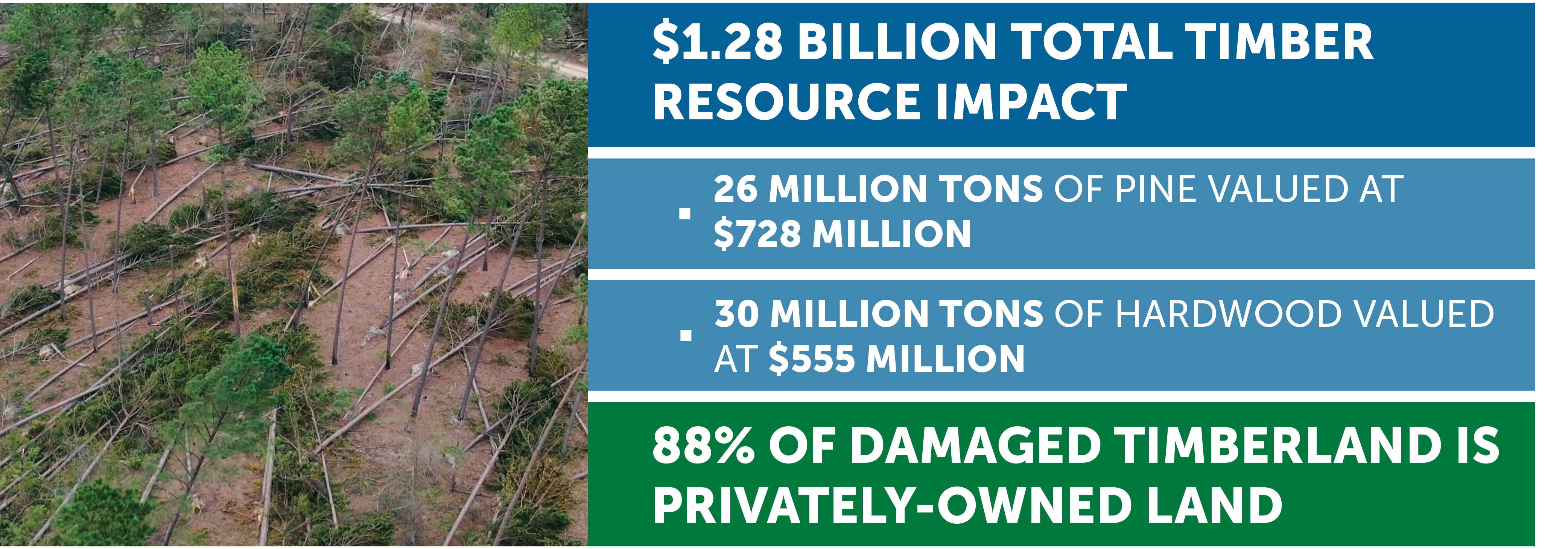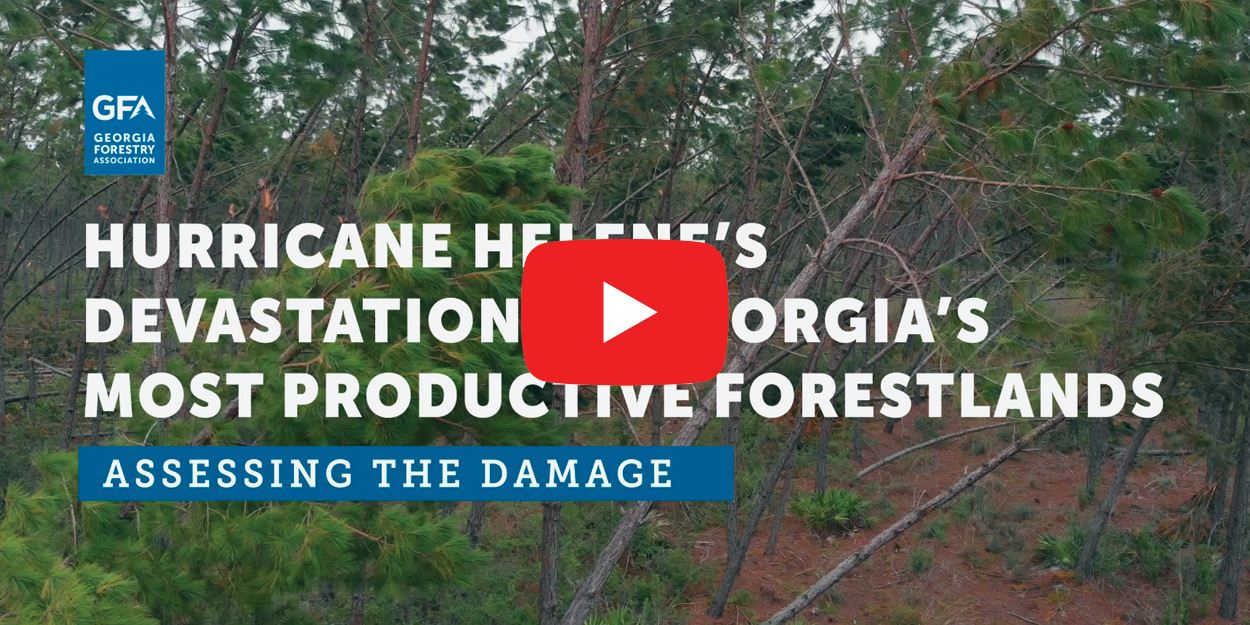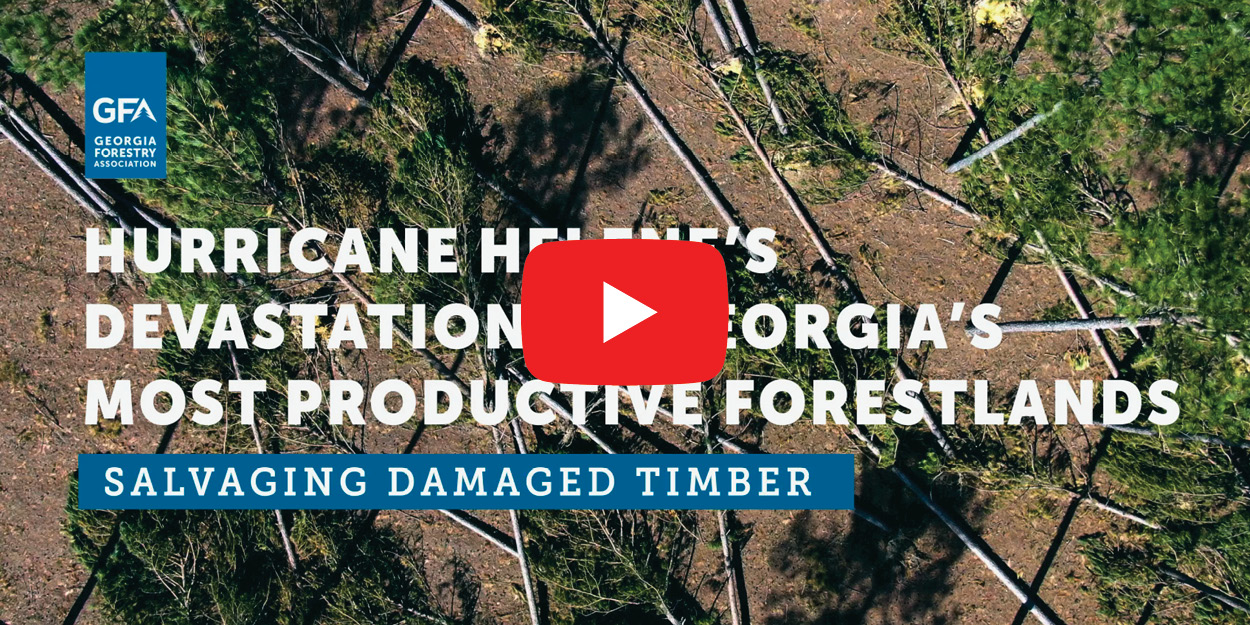Advocating For Forest Landowners Devastated by Hurricane Helene
Restoring Our Working Forests
GFA is engaging with state and federal lawmakers to prioritize legislation addressing the impact of Hurricane Helene on the forestry sector, focusing on creating incentives and relief programs that help stabilize the forest products market, protect land value, and ensure the sustainability of forestry operations in Georgia.

See Why This Matters
In the weeks following the storm, the Georgia Forestry Association visited the most devastated areas of South Georgia, concurrently the state’s most productive forestlands. By sharing their stories, policymakers can begin to understand the challenges the tree farmers and their families are facing following Hurricane Helene’s devastation.

HOW FEDERAL & STATE POLICES CAN HELP
→ Block Grants
→ Permanent Crop Loss Program
→ Harvest Tax Suspension
→ Reforestation Tax Credit
→ Maintaining Higher Truck Capacity Limits
Collectively, these policy initiatives represent a comprehensive approach to disaster recovery, addressing both immediate and long-term challenges faced by the forestry sector.
Block Grants
Block grants are a critical component of disaster recovery, offering state agencies the flexibility to allocate resources in response to the specific conditions and needs of affected regions. In the forestry sector, where storm impacts can vary widely across different landscapes, block grants provide the ability to implement localized solutions that address the unique challenges faced by impacted areas. By empowering state agencies with discretionary funding, these grants facilitate the swift repair of damaged infrastructure, support reforestation efforts, and deliver targeted assistance to forest landowners. This adaptive approach enhances the overall efficiency of recovery operations, helping to minimize disruptions and reduce the economic and environmental downtime for Georgia’s forestry sector. Ultimately, block grants enable a more resilient and responsive recovery, ensuring that critical forestry operations can resume swiftly and sustainably.
Back to Relief Efforts→
Permanent Crop Loss Program
A permanent crop loss program tailored to forestry is critical to safeguarding the economic stability of forest landowners and forest operators in the face of increasingly frequent natural disasters. Existing agricultural loss programs do not provide support for forestry and the sector’s unique challenges, where recovery timelines are longer, and market disruptions are more severe. Establishing a forestry-specific program would ensure that forestry landowners have access to timely and predictable financial relief in the face of life-altering disasters, thereby encouraging sustainable replanting efforts and mitigating long-term economic loss.
Back to Relief Efforts→
Harvest Tax Suspension
The temporary suspension of the state harvest tax on timber for the fourth quarter of 2024 is essential to alleviating financial pressures on landowners affected by Hurricane Helene. The imposition of harvest taxes during post-disaster recovery can hinder efforts to restore operations and stabilize communities. By suspending this tax, the state can provide landowners with the short-term relief necessary to reinvest in operations and accelerate recovery, ultimately benefiting both the forestry sector, rural communities and the broader economy.
Back to Relief Efforts→
Reforestation Tax Credit
A reforestation tax credit, modeled after the success of Georgia House Bill HB4EX following Hurricane Michael, would provide financially strained landowners in affected areas the opportunity to engage in reforestation efforts. In the aftermath of natural disasters, financial support for replanting is crucial to ensuring long-term sustainability, restoring ecosystem services, and maintaining the economic value of forests. A targeted tax credit would not only promote sustainable forest management but also encourage proactive investments in resilience, contributing to the health of Georgia’s forestry sector and rural communities.
Back to Relief Efforts→
Maintaining Higher Truck Capacity Limits
The maintenance of higher truck capacity limits plays a crucial role in both storm recovery and the ongoing economic viability of the forestry sector. Higher allowable truck weights enhance the efficiency of timber transportation, streamlining supply chains and lowering logistical expenses. During recovery efforts, the ability to move damaged timber more quickly limits spoilage and waste, preserving market value.
Back to Relief Efforts→
For More Information
Visit the GFA LIVE Hurricane Helene Blog for Resources and Information.




